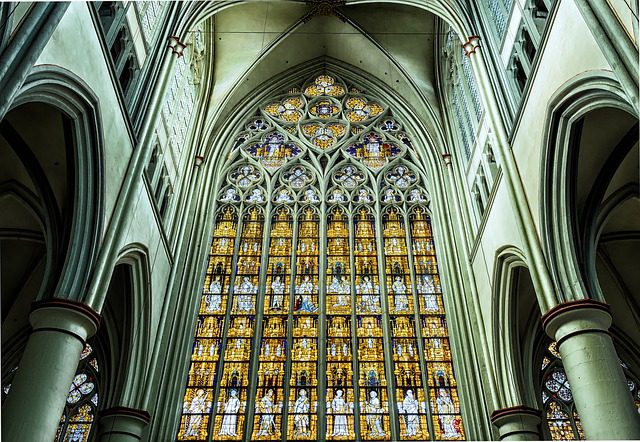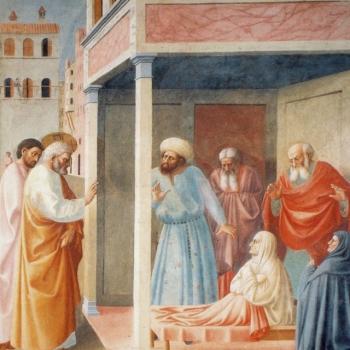
Kim Bishop is a member of the Charismatic Episcopal Church. We have been friends online for many years , and recently engaged in the following (public) dialogue on my Facebook page. The discussion there is a little longer than it is here. I think it brings into focus many basic Catholic-Protestant differences in outlook. Her words will be in blue.
***
I have a question for you Dave. During the schisms in the church the leaders got together and decided that the Creed was what was necessary to be in the true church. If that is the case (unless I’m wrong which I very may well be) why is it necessary to believe in Papal supremacy, marian theology, purgatory, and other adiaphora issues. If we agree on the creed why the separation? (honestly curious; not trying to be troublesome).
I ask this after talking with someone who believes they can just read the Bible with the Holy Spirit guiding them; they don’t need church, just a personal relationship with Jesus (which I find bizarre). And it got me thinking, with all the crazy things people believe, why aren’t the creeds enough? Obviously this person would not hold to the creeds.
We say that those things are the fullness of apostolic Christianity, and so we require them for belief. They were there, developed through time, in Catholicism, from the beginning till the 1500s, when Protestants decided to discard them. We see no reason to discard them, too, since they were received from unbroken apostolic succession / tradition.
We can still unite to a large extent on the basis of the many other things we agree on. But note that the Nicene Creed also contains baptismal regeneration / forgiveness, which most Protestants reject. And I would contend that Protestants also fundamentally changed the meaning of “one, holy, Catholic, and apostolic Church.”
I agree with all the parts of the Creed, and do say one holy catholic and apostolic church (although perhaps I do understand that slightly differently than you.) But the adiaphora shouldn’t matter so much. I’d love to go to Catholic Mass, but if I’m refused the sacrament of communion then why bother?
It doesn’t matter to those who think it doesn’t matter. To those who do, it does!
But does it matter to God?
If it didn’t, there wouldn’t be so much about “the doctrine” and “the truth” and “the faith” and “tradition” in Scripture.
I don’t disagree, but I think sometimes the little things that aren’t important get made more important than they need to be.
Again, you believe they are unimportant and “little.” Who decides these things? The Catholic Church thought they were important for fifteen centuries before the Protestants came around and tossed them on the garbage heap. We appeal to the community and the tradition. Protestants ultimately appeal to the individual and their judgment.
The question then becomes: why accept the Protestant “subtracted / diminished / truncated” version of Christianity rather than the one that had prevailed all those centuries? I don’t think Protestants have ever offered a good answer to that.
All we can go by is the scriptural and historical / traditional evidence as to what was believed, and what should have been believed. And I believe that both decisively back the Catholic position. I became a Catholic because of the historical evidence, then since my conversion I have seen in every instance, that Scripture also confirms Catholic positions and not Protestant ones, where they differ from each other.
I have no problem accepting Mary as the mother of God. Jesus was/is God, Mary is his mother, ergo Mary is the mother of God. I don’t even see the argument there. But I have tried to surrender to the teachings on Mary and saints and while I understand the concept of praying to saints passed on from a Catholic perspective, I do not see the need, as I can go directly to God through Jesus. Other aspects of marian theology [like] queen of heaven and getting credit for bringing people to salvation don’t go. But believe me, I have tried and just been repelled by it. I have no problem making the sign of the cross which I do when using the invocation or other traditional things, but I have to follow my conscience as well and I am not there. And the Kingdom of God is not like the earthly kingdom therefore using worldly actions and traditions to explain it doesn’t really work. Thanks for taking the time to answer though.
See my two posts on why it is scriptural and sensible to pray to saints as well as to God (one / two).
St. Paul brought people to salvation also (as he stated many times). The Bible says that a wife can “win” a husband. But it’s incomprehensible that the Mother of God might also do so?
If tradition is part and parcel of Holy Scripture, then tradition is part of the kingdom. What you are doing is basically ignoring that aspect of Scripture, but it can’t be done. It’s too much a part of the whole thing.
I’m not ignoring apostolic tradition, but I do take exception to post apostolic tradition. That is why I can never be in the RC. I hold that my salvation comes from Christ’s sacrifice not church traditions. I believe the traditions of church help us on this earth to stay in the faith, but traditions do not save.
We believe, as you do, that we are saved by the blood of Christ shed on the cross on our behalf, entirely by God’s grace and mercy. We never say that “tradition” is what saves us. We do say that this salvation gained on the cross for us by Christ, is mediated through the Church in some fashion. But Calvin and Luther say the same thing, so that’s not really a Catholic thing only.
The basic tenets of faith are what matter in salvation.
Where do you get that notion from? Where is it in Scripture? If it’s not from Scripture, then it’s merely a Protestant tradition, isn’t it?: in which case, the non-Protestant wonders why you place so much confidence in it (while objecting to our traditions).
I asked a simple question about the Creeds due to a real question and as always get thrown into a discussion on church traditions.
That’s not exactly what happened. This makes it sound like I hit you over the head with a bunch of traditions. You brought them up, not me. You wrote: “why is it necessary to believe in Papal supremacy, marian theology, purgatory, and other adiaphora issues?”
If you ask me to explain traditions, how is it that I am supposed to answer without discussing them? You’re the one who introduced the topics. I didn’t “throw you” into anything!
***
Photo credit: photograph by “Tama66” (9-29-16) [Pixabay / CC0 Creative Commons license]
***













